|
 Become
a fan on Facebook
Become
a fan on Facebook  Follow
on Twitter Follow
on Twitter
Article by Mark Dujsik | December 26,
2011
Here
are the ten best films of 2011:
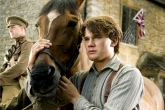 10.
War Horse 10.
War Horse
Subtlety
does not fit into the equation of War Horse, a big film about big themes,
nor should it. This is a bleak film about heroism, innocence, and humankind's capability
to continually find new, crueler ways to destroy those virtues and itself. It follows a horse, which helps a boy (Jeremy Irvine) and his family out
of financial difficulties only to find itself in the fields and trenches of
World War I for its troubles. The episodic narrative reveals various people—from two young brothers
(David Kross and Leonard Carow), whose promise to their mother conflicts with
their duty as soldiers, to a young girl (Celine Buckens) and her grandfather (Niels
Arestrup), who strive for normalcy as the war rages around them—trying to
survive. Director Steven Spielberg accomplishes an intimate portrayal within a
grand scope with staggering technical prowess. While the sentiment behind the story might seem undemanding, it is an
intricately woven tapestry of emotions and ideas. Spielberg believes that an equine can symbolize an angel of our better
natures, and the film is all the better for it.
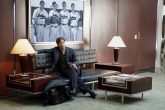 9.
Moneyball 9.
Moneyball
An
underdog sports film for those of us who have grown tired of the underdog sports
movie formula, Moneyball observes the business side of the game of
baseball. Billy Beane (Brad Pitt, in a refined slow burn of a performance that is
always on the edge of igniting)—himself a former, failed professional baseball
player—attempts to reinvigorate the lowest budgeted team in Major League
Baseball by using empirical data to choose the best possible team in a sport
where the fans, the news media, and those in charge have come to expect home
runs and star power. No one—save for his new, numbers-minded assistant (played by Jonah
Hill)—believes it will work, and Steven Zaillian and Aaron Sorkin's screenplay
examines the prejudiced rationale for those folks' insistence that things be
done the way they always have been: Because that's the way things have always
been done. Director Bennett Miller reduces the complex system Beane adopts, instead
focusing on the power struggles behind the scenes and Beane's burning desire to
finally make something out of what he believes is a wasted life.
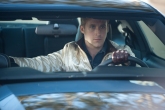 8.
Drive 8.
Drive
Every
so often during Nicolas Winding Refn's relatively quiet, reflective study of a
man with a very specific array of rules, violence erupts in the form of a car
chase or a brutal, bloody murder. Even then, Drive is still a vibrant character study, and those
pulpy and pulsing action sequences are illustrative extensions of the unnamed
Driver (Ryan Gosling) and the gallery of rogues surrounding him. The opening sequence, a cat-and-mouse pursuit through the streets of a
gloriously seedy L.A. that is a virtuoso piece of a form, informs us of
everything we need to know about this enigmatic man and his way of life. The prospect for variation arrives when he meets an essentially single
mother named Irene (Carey Mulligan)—a woman for whom he's willing to break his
rules—and gets caught up in her husband's (Oscar Isaac) effort to escape a
criminal life. Hossein Amini's screenplay (based on a novel by James Sallis) is
surprisingly empathetic; even the antagonistic characters (including one played
by an uncharacteristically villainous Albert Brooks) have at least one defining
scene to make their motivations understandable.
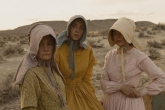 7.
Meek's Cutoff 7.
Meek's Cutoff
Meek's
Cutoff shatters whatever romantic notions we might have of pioneers blazing
the trails of the American West during the middle part of the 19th century. Based on a historical event, the film follows three families that have
separated from the main wagon train and become lost on a shortcut suggested by
their guide Stephen Meek (Bruce Greenwood). Chris Blauvelt's naturalistic cinematography is a major part of the
storytelling. Darkness is crushing. The inescapable box of the Academy ratio presents an endless wasteland
towering above and descending below the characters. Jonathan Raymond's screenplay presents clearly drawn dichotomies (the
roles of men and women, choices based in reason and on emotion, and, most
important of all, life and death—epitomized by the climactic image of a tree
that is either growing or dying), and the distinction between good and evil is
the entire question. Director Kelly Reichardt manages fine performances from the cast,
especially Michelle Williams and Ron Rondeaux as "the Indian," who
could mean the group's salvation or ruin. This is a thoughtful film that turns the archetypical structure and
character of the traditional Western on its head.
 6.
Beginners 6.
Beginners
Despite
the simplicity suggested by the title, there is nothing simple in the way Oliver
(Ewan McGregor) sees the world or the way writer/director Mike Mills presents
that outlook. Both Beginners and its central character are adept at
compartmentalizing complex emotions, which Mills represents through an
assortment of visual gags and montages of general objects or people and
specific, defining moments in Oliver's life. At 38, Oliver meets an actress (Mélanie
Laurent), starts dating her, and learns that their relationship might be over
before it even really begins. At 75, His father Hal (an excellent Christopher Plummer) came out of the
closet, got a boyfriend, and learned he had a fatal form of cancer. Past, present, and Oliver's imaginative introspection of both come
together, as a single gesture from one person brings to mind a summation of his
relationship with another and the emotions of Hal's death to flood back with the
view of the back of man's head. There's inevitable devastation here, but there's also a sense of sincere
appreciation at the recollection of lives lived with a purpose—joy in the
places we're accustomed to misery.
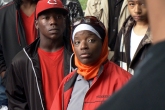 5.
The Interrupters 5.
The Interrupters
Steve
James' harrowing documentary serves as a record of a year in the city of Chicago
during which it became national news that the total count of murders in the city
outnumbered the deaths of American soldiers in Iraq over the same period of time.
In the summer of that same year, the number was almost double. The Interrupters is in the trenches with CeaseFire, an
anti-violence non-profit organization that did not receive any of the national
media attention that the cause of their mission did. While politicians and activists hold press conferences in the background
about the epidemic of violence, CeaseFire and its volunteer
"interrupters"—intermediaries within local communities who arrive at
the scenes of crimes to cool down the useless desire for revenge, speak at
funerals, and visit with families who are suffering from the loss of a murdered
loved one or who want to help a family member before it comes to that—actually
do something about it. The film accompanies three of these interrupters, all of whom have a past
criminal life and have arrived at the conclusion that their experiences can
improve the lives of others, and it is a testament to the possibility of
redemption for the individual and society as a whole.
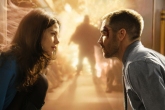 4.
Source Code 4.
Source Code
A
gripping amalgamation of a race-against-the-clock thriller and mind-bending
science-fiction, Source Code is the sort of intelligent, succinct, and
inventive film of which Hollywood should be making more. The gimmick of Ben Ripley's screenplay is a
doozy. Colter Stevens (Jake Gyllenhaal), a veteran of the war in Afghanistan,
has eight minutes to find a bomb on a commuter train outside of Chicago to stop
another, more destructive attack within the city, and through a miracle of
quantum physics, he has a seemingly limitless number of the eight-minute blocks.
There's a dual mystery beneath this cunning scenario: the identity of the
bomber and the nature of Colter's existence. On the train, he has a personification of kindness and decency in
Christina (Michelle Monaghan) to simultaneously keep him focused on his goal and
haunt him with the realization that, no matter what he does, a group of people
has died; in his other reality, he has a sympathetic military contact (Vera
Farmiga) who knows all but cannot say. Director Duncan Jones has crafted an old-fashioned thriller with an
existentially mournful through line. On this phantom train are lives cut short, and between the tiers of
reality lies a beating heart that recognizes the human cost of it all.
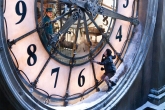 3.
Hugo 3.
Hugo
Martin
Scorsese, the great director and advocate of film preservation, has made a
delightful fable that also functions as activism with Hugo. It tells the story of a young orphan named Hugo Cabret (Asa Butterfield)
who lives in a train station in Paris during the early 1930s, maintaining the
clocks throughout the station after the deaths of his mother and father (Jude
Law) and being abandoned by his uncle (Ray Winstone). The boy is working to repair an automaton—that and a notebook are the
only things his dad left him—in his spare time in the hopes that it will
reveal a message from his dead father. Also involved are an irritable toy maker (Ben Kingsley), his literate
goddaughter and ward (Chloë Grace Moretz), an orphan-hating station inspector (Sacha
Baron Cohen), and a film historian (Michael Stuhlbarg) who is convinced Hugo
might have a key to resolving the sad story of Georges Méliès, the filmmaker
who brought joy to Hugo's father with a "dream in the middle of the
day." The film is full of visual spectacle (Robert Richardson's cinematography
offers perhaps the best use of 3-D to date) and cinematic allusions. It's a valentine to cinema by one of its modern masters—a project of
passion that lives and breathes with an unshakeable adoration of the medium and
of the power of narrative itself.
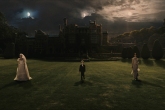 2.
Melancholia 2.
Melancholia
We see the Earth
destroyed twice in Melancholia. The
first time, it is almost romantic—slow motion, idyllic tableaux of harbingers of
doom, metaphors of inner turmoil, and a majestic wide shot of a massive rogue
planet crashing into Earth and sending rubble rocketing into space. The second, it is intimate and
horrifying. In between the prologue and the deafening cacophony of the final shot,
the lives of two women are devastated. They
are sisters named Justine (Kirsten Dunst, hypnotizing in a performance of
chilly, calculated vocal inflection and dead eyes that perfectly captures the
nature of depression) and Claire (Charlotte Gainsbourg, traversing the
emotionally draining terrain of imminent mortality in the performance of the
year). They are lovers of chaos and
order respectively, and the contrast between them is both fascinating and a way
to accentuate their own unique personalities. Divided into two parts, the film begins in earnest on Justine's wedding
day, as she falls apart against the organization of her posh wedding reception. The second chapter observes Claire as she comes to realize that the giant
planet approaching Earth will inevitably destroy her and everyone she loves;
Justine, meanwhile, thrives in knowledge.
Writer/director
Lars von Trier pokes and prods at a primal nerve, and as discomforting as the
subject of Melancholia is, the script's complex characterizations and the
film's single-minded focus are also exhilarating. This is a fearless film with the power to shake one to the core.
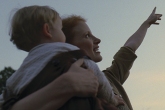 1.
The Tree of Life 1.
The Tree of Life
This is, quite
simply, a triumphant piece of filmmaking, at once befuddlingly personal (Some
images, like a clown in an attic, perplex) and intensely universal (figuratively
and, given a breathtaking sequence that explores the origins of the universe and
life on Earth, literally); it is the best film of the year. The Tree of Life encompasses the myriad realms that its title
suggests—science (The aforementioned sequence also details the evolution of
life on Earth), religion (Characters whisper to an unseen "you," and
during that montage of evolution, there is a single shot of a single tree
growing in a lush, green plain that suggests Eden), and philosophy (Of course,
everything within the film is connected by its fluctuating form). In between its gorgeous interlude of creation and its equally enigmatic
valediction at the end of all things is the story of an everyday family in Texas
in the 1950s, as remembered by a man named Jack (Sean Penn). Young Jack (Hunter McCracken) is torn between his parents, his father
(Brad Pitt), whom the boy says represents "nature," and his mother
(Jessica Chastain), whom he says represents "grace."
The
consensus, from the piecemeal biography some have assembled for him, is that
writer/director Terrence Malick grew up in this place and time. Of course the film is autobiographical, and, at the same time, it doesn't
matter. Reality and
metaphor exist as peers—as do life and death—as the film's collective voice
cries out for some recognition of the meaning in it all. The Tree of Life is an astounding mediation on that most communal
of human experiences: At one time, we were innocent and untroubled, and then we
were not.
Honorable Mention:
Harry
Potter and the Deathly Hallows: Part 2, Incendies, Trust
Copyright © 2011 by Mark Dujsik. All
rights reserved.
 Back
to Home Back
to Home
|
Buy Related Products

|
